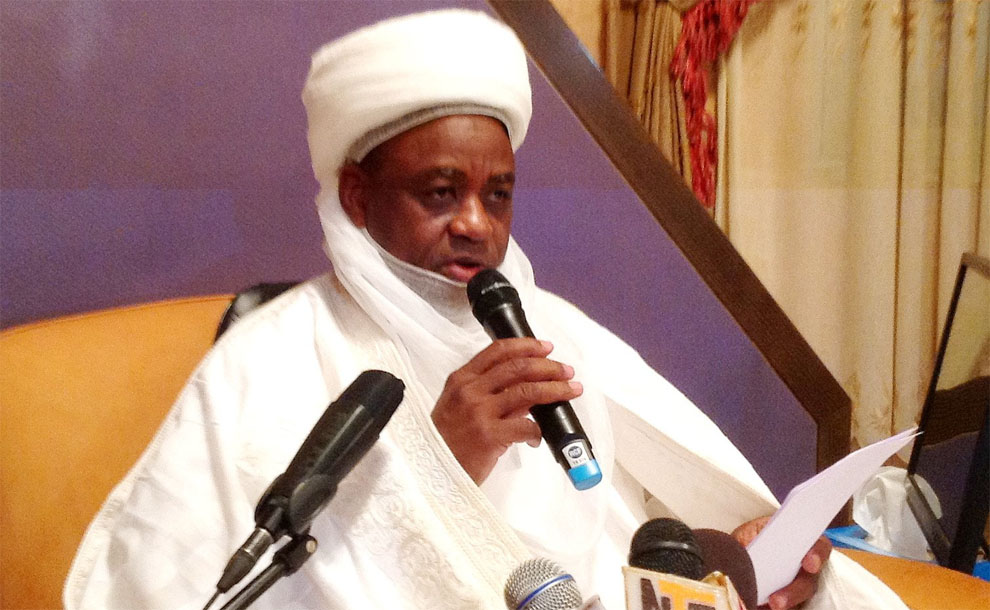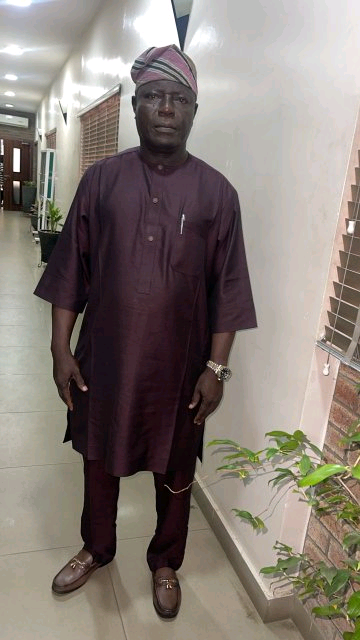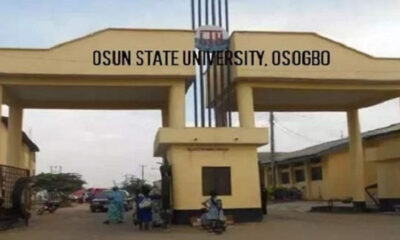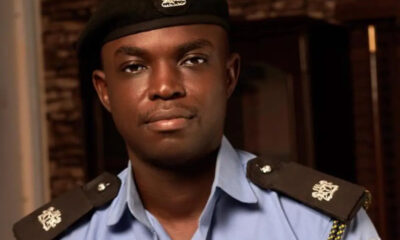metro
I spent 28 years on death row for nothing — Onwuche, 68-year-old cook

Thirty-nine years ago, Mr. Innocent Onwuche, an indigene of Umuahia, Abia State was a relatively comfortable man. He had a wife, a son, and a comfortable job as a cook in the residence of a very notable accountant in Ibadan, Oyo State.
A few years before then, he had voluntarily left the services of one of the biggest firms in the South-West at that time, after working for 10 years as a cook.
For someone who had no formal education, Innocent considered himself a successful man among his peers. Life, however, suddenly took a bad twist for him one fateful morning when a team of policemen pretending to be job seekers arrested him outside the gate of the house of his boss and bundled him into their van.
Arrested, tortured for unknown crime
Narrating how the incident happened, Onwuche said: “I was inside my Oga’s house when someone told me that some people outside were looking for me. The person said they were looking for a job and wanted my assistance. Immediately I stepped outside the gate to meet them, they grabbed me. I was confused and began to fight them. The vases in front of the house were all broken during the fight. But they finally subdued me and bundled me into their van.”
Onwuche said he was taken to Sango Otta Police Station where he was beaten thoroughly for fighting the policemen who arrested him. According to him, despite his persistent inquiry, no one told him his crime. He said: “While at the police station, no one told me what I did. In the morning, I was seriously beaten again by the policemen who claimed that I used charm to fight them. They broke my leg with their baton, poured a bucket full of urine by some prostitutes arrested the previous night on me.
READ ALSO:
- 2023: Don’t Direct Yoruba to Support Any Aspirant, Obasanjo Tells Ooni
- 2023 polls: Anxiety in INEC over shortage of commissioners
- I paid dealer N2,650 for car worth N2.65m –Suspected Osun fraudster
“I was in serious pain and couldn’t walk. That morning they said there was no cell in Sango Otta Police Station and that they were taking me to Bodija Police Station. On our way to the station, they stopped at Sango Market, bought about 12 canes. When they got to the station, they descended heavily on me with the canes.”
Writhing in pain from his broken bones, Innocent said he continued to ask them his offence until the police officers finally told him that a man had died from an acid wound and that he (Onwuche) was responsible for the death. “Two days after my arrest, they told me that I poured acid on someone and that after three days, the man died in the hospital,” he said.
Scammed by late acid attack victim
Recalling his connection with the man who was said to have died from an acid attack, Innocent said he was shocked over the allegation that he killed the victim. “I was shocked when they said I poured acid on the man. When they described the man, it was then I recalled that he was the one that duped me of N17, 650 some months back,” he said.
Giving further details of his connection with the dead victim, Onwuche stated: “One of my friends then, Balogun, introduced me to some men who I later discovered were into fraud. They asked me to write a letter for them and after some days, they came to thank me that the letter worked for them. Another day, they met me on my way to Sango Market and insisted that I must know their house. When I got to their house, they showed me how they can use black soap to make someone rich. They duped me N17,650 that day.
“I later met one Fred who offered to assist me to recover my money. He brought some soldiers who went with me to recover the money. The soldiers flogged the fraudsters but still, they couldn’t produce my money. They, however, left the fraudsters after they promised to pay my money back. I kept disturbing them but they never paid me the money. It was after some months that the police arrested me for the death of one of the fraudsters through an acid attack.”
Onwuche’s trial for the murder of the man whom he insists duped him lasted for eight years with many dramas. From the Magistrate Court, the matter was moved to the High Court following the advice of the Directorate of Public Prosecution, DPP, that he had a case to answer.
Mysterious deaths
Whether it was a sign of his innocence, he could not tell, but Onwuche noted that four out of the five persons that testified against him in court died mysteriously. According to him: “The deceased man’s mother insisted that I came alone while another witness said I came in the company of three other people. The late man’s wife died of complications from abortion on the day he was to testify in court. The interpreter also died; likewise the third witness. The late man’s son called Bala also died; making it a total of four persons that died in the matter.”
READ ALSO:
- Repentant wife, Taiwo Obasanjo, ‘publicly’ begs OBJ: I’m genuinely sorry
- Tambuwal: Defective Military Operation in Zamfara Made Sokoto Vulnerable to Bandits’ Attacks
- Bandits Kill kidnapped ECWA Church Pastor, after collecting ransom
Condemned to death
When Onwuche’s trial began at the High Court, he could not afford a lawyer and had to rely on the services of a pro-bono lawyer from the Office of the Public Defender, OPD. Despite insisting on his innocence, the court found him guilty and sentenced him to die by hanging on December 16, 2002. ‘I never committed that crime,’ he told our correspondent. Innocent’s conviction never went to appeal because he could not afford it. A lawyer, who had offered to appeal on his behalf pro-bono, had a fatal accident on his way to file the court process and that was the end of any attempt to prove his innocence at a higher court.
Abandoned by family
For the 28 years Onwuche spent in prison, he was never visited by any of his family members or close relatives. His wife abandoned him immediately after his arrest and went away with their only son who was just an infant then. Fighting back tears as he recalled how his wife and her mother treated him, he said: “Immediately I was arrested and taken to the police station, she left me. She came to see me three times at the police station with her mother and that was all. I had a son with her and she took him away.” During the period of his incarceration, Onwuche lost his mother and his older siblings. His father died before he was imprisoned.
Scary nights in death row cell
When asked to describe what it is like to be in a death row cell, Onwuche paused for some seconds before saying: “I don’t wish my enemy the things I went through in death row cell. Because there was no gallows in Agodi prisons, after I was convicted, they took me to Ibara prisons where I spent years in a dark cell. The cell was dark throughout the day.” Pointing to his infected eyes which he struggled to open intermittently, he said: “I cannot see well now because of that dark experience. These two eyes are almost gone.”
Continuing with his narration about the death row cell, he said: “We stay days without seeing the light of day. Sometimes, we are about 56 condemned prisoners in one cell. They just pack us like Sardine. Bathing was also a problem. If you see one bottled water to bath with for a month, you will be very happy. The stench from the cell can kill a normal person.
“As a condemned prisoner, I don’t have any hope other than to wake up every day and pray. Fridays were usually the scariest days for me and others there because that was when the black-maria usually comes to take those to be executed. Once they come, our death row inmates will tell us ‘Omo chop your beans, time don come o’. In the morning of any execution day, you will hear warders barking like dogs during the parade. Immediately they open the cells, they will handcuff and leg-chain those to be executed and take them away.
Once any person has been taken away, the rest of us will be panicking because we don’t know who will be next. Immediately they take one or two persons out, the rest of us will start purging. We can go to the toilet several times out of the anxiety of who is next. In the morning you will hear something like ‘four blankets don lost’, meaning four inmates have been killed the previous night.”
Freedom at last!
Freedom was the last thing on Onwuche’s mind as he went through the ordeal of waiting endlessly for the hangman’s rope. The best he hoped for was to commute his death sentence to life imprisonment, unknown to him that the state government had already considered and granted his plea for freedom. Onwuche said he wept for joy when the news of his release came.
“From time to time, we usually wrote a letter of clemency but we are not even sure whether it got anywhere,” he said. Continuing his narration, he said:” The prison official collected money from us for the letter but often time we did’nt get the result. We just continued writing with the hope that one day, something would happen. We gave prison officers over N8, 000 for delivery. In the last week of November, I was shocked when my name was mentioned among those that have been granted amnesty. I cried because I know I didn’t commit the crime for which I was convicted.
Regrets
Onwuche concluded his story by pointing out that he has forgiven those who accused him wrongly. His only regret, however, is the pain and wasted years. “I don’t hold a grudge against those who accused me wrongly. What pained me most is that I had to go through all these because of N17,650. What is the value of that money now? If I had let go of that money without making any trouble, at least I would have been able to buy a bicycle, at least if I didn’t achieve much. Imagine spending 28 years because of N17, 560!’
Appeal for assistance
Appealing to Nigerians to help him restart his life, Onwuche said: “The reason many inmates go back to crime is that when they come out, nobody wants to assist them. When there is no job to do, how do you expect them to cope with their new life? Government should provide jobs for them. If I can get just an oven now, I will start baking and become useful to myself and my family. I can also fry buns and chin chin. I can make disinfectants and hair cream. I just need assistance to start a new life. I learned so many things while in prison from NGOs that come to talk to us. I learned baking and other handiwork. I acquired over 10 certificates while there.”
– by Henry Ojelu/Vanguard News Nigeria./The Eagle
metro
Ramadan ends in Nigeria, Sultan announces March 30 as Eid-el-Fitr

Ramadan ends in Nigeria, Sultan announces March 30 as Eid-el-Fitr
Sultan of Sokoto, Muhammad Abubakar Sa’ad, says the crescent moon marking the end of Ramadan fasting has been sighted.
The Sultan, who is president of the Supreme Council for Islamic Affairs (NSIA), said in a broadcast on Saturday night, “Today marks the end of the Ramadan fasting and Sunday, March 30, is the Eid-el-Fitr celebration.”
metro
Embrace environmental sanitation during Eid-Fitr, LAGESC boss tells Lagosians

Embrace environmental sanitation during Eid-Fitr, LAGESC boss tells Lagosians
By Dada Jackson
The Lagos Environmental Sanitation Corps (LAGESC) has urged Lagosians to embrace proper environmental practices and obey the state’s environmental laws ahead of the Eid-l-Fitr festivities to mark the end of the Ramadan fast by Muslim faithful around the world.
Corps Marshal of the agency, Major Olaniyi Olatunbosun Cole (retd), sounded the call at the agency’s command headquarters at Bolade-Oshodi.
He said, ‘‘The Ramadan fast is a testament to the willingness of Muslim faithful to adhere to the pillars of their faith and it is enjoined that cleanliness is an important religious practice in all faiths, which is why we admonish Lagosians to imbibe proper waste disposal and keep their environment clean during the celebration.”
Cole also advised Lagosians to make proper use of pedestrian bridges for their safety instead of crossing highways to prevent ‘hit and run’ cases by speeding motorists.
He equally read a riot act to miscreants in the habit of converting pedestrian bridges to sleeping areas which deters Lagosians in transit, pedestrians vowing that anyone caught w be made to face the state Environmental laws as amended
The KAI boss also revealed that the agency had recorded giant strides and would not relent in ridding pedestrian bridges across Lagos of criminal obstructions, traders and hawkers with daily arrests made alongside secured prosecutions by the Courts.
The Corps Marshal also warned Lagosians to desist from street trading, use of Styrofoam pack, hawking in traffic, patronage of cart pushers for refuse disposal, and erection of illegal structures on laybys, setbacks, medians, road verges, kerbs or around public schools in the state.
The KAI head said offenders would be made to face the consequences via prosecution in a competent court of appropriate jurisdiction.
metro
Mother, daughter who stole ponmo, stock fish in Ogun jailed six months

Mother, daughter who stole ponmo, stock fish in Ogun jailed six months
A Magistrates’ Court in Abeokuta, Ogun State yesterday sentenced a mother, Falilatu Amidu, and her daughter, Ayisatu, to six months imprisonment each for stealing dry ponmo, stock fish and dried meat valued N1 million
The defendants, who reside at No 21 Ago-Oko area of Abeokuta, were convicted on a two-count charge of conspiracy and stealing.
The Magistrate, Mrs O.O. Odumosu, held that the evidence presented by the prosecution had proven beyond reasonable doubt that the convicts were guilty of the offence as charged.
Odumosu sentenced both mother and daughter to six months in prison each with an option of N5,000 fine.
She ordered that the convicts should refund N100,000 each to the complainant as restitution before accessing the N5,000 fine option.
Earlier, the prosecutor, Insp. Kehinde Fawunmi, had told the court that the defendants committed the offence at Lafenwa market sometime in August 2024.
Fawunmi explained that Falilatu conspired with her daughter, Ayisatu, to steal a big sack containing stock fish, dried ponmo and dried cow meat valued N1million, belonging to one Mrs kafayat Alao.
According to him, one of the defendants, Falilatu, used to help the complainant to carry load from her store in Lafenwa to where the complainant sells her items.
READ ALSO:
- Ex-Rivers HoS wife cries for help over husband’s safety
- Fubara reacts as Ex-HOS, Nwaeke accuses him of bombing oil pipelines, Rivers Assembly
- Natasha: Emmanuel Uduaghan threatens to sue Senator Nwaebonyi
“The complainant asked her to help her pick some goods from the store. She waited for over an hour and did not see the defendant, which made her to go to the store to check on her.
“On getting to the store, she did not find Falilatu, and she noticed a big bag containing dried meat, ponmo and stock fish was missing while the defendant was nowhere to be found,” he said.
Fawunmi further explained that Falilatu stole the goods and gave it to her daughter (Ayisatu) to sell. He said Ayisatu received the goods from her mother, knowing that they were stolen.
The prosecutor noted that the offence committed contravened sections 516, 390(9) and 127 of the Criminal Code Laws of Ogun 2006.
Mother, daughter who stole ponmo, stock fish in Ogun jailed six months
-

 Uncategorized9 hours ago
Uncategorized9 hours agoBreaking: Moon sighted in Saudi, UAE, others, Eid-Fitr holds Sunday
-

 metro3 days ago
metro3 days agoRivers administrator Ibas fires Fubara’s political appointees
-

 metro3 days ago
metro3 days agoJUST-IN: Ex-Oyo gov Ajimobi’s first child Bisola dies At 42
-

 metro3 days ago
metro3 days agoFG declares public holidays for Eid-el-Fitr
-

 metro2 days ago
metro2 days agoEFCC re-arraigns son of ex-PDP chairman for alleged N2.2bn oil subsidy fraud
-

 Africa3 days ago
Africa3 days agoNiger coup leader sworn in as president for five years
-

 metro3 days ago
metro3 days agoNatasha: Murray-Bruce slams Atiku, defends Akpabio
-

 International3 days ago
International3 days agoAI will replace doctors, teachers, others in 10 years – Bill Gates













